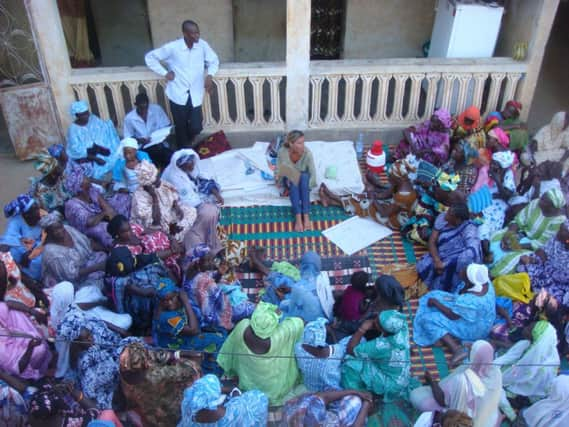Building the future in face of adversity


Today rain is rarer, weather is hotter, and we have stronger winds and shorter time to grow vegetables…”
This is how a woman addresses the impact of climate change in the Moundouwaye Village in northern Senegal.
Advertisement
Hide AdAdvertisement
Hide AdI am in the Podor Region of Senegal on the border with Mauritania, conducting a series of scenario-planning activities with the communities of Guédé Chantier, Lahel, Moundouwaye and Diarra for the launch of a three-year food security project. Supported by the UK government, its purpose is to develop 150 hectares of community land to produce more food more efficiently, and increase the communities’ resilience and capacity to adapt to the advancing effects of climate change. It will directly benefit more than 3,000 community members, especially women, by enhancing their agricultural and economic knowledge and skills.
As I travel the region, I am advised to read the insightful article by Binyavanga Wainaina on How to Write About Africa, an irreverent take on western attitudes towards Africa and our perceptions of a dark continent “hot and dusty with rolling grasslands and huge herds of animals and tall, thin people who are starving”. My experience reveals nothing of the sort. On the contrary, I meet groups of empowered women and farmers proud of their culture, valuing simplicity and extending generosity beyond family links. They cook from the same cooking pot and eat from the same communal bowl. However, their once-fertile land is drying out…
An elder who holds the memory of the past shares her thoughts: “We used to have thick forests with lions, hyenas and elephants behind very tall grass, the rivers were full of crocodiles and we needed company to walk under the stars. Today the forest looks like a skeleton and the animals have left us.”
The agricultural viability of small-scale producers in Podor is under threat mainly due to the transfer of the most productive land, from food production for local needs, to export for consumption by the global consumer class. Misguided agricultural policies over the decades have turned their fertile soil by the River Senegal into a barren wasteland resembling a lunar landscape.
But despite the state of the land and the threat posed by climate change, through a series of future scenario gatherings, villagers articulate a positive vision for food and livelihood over the next decades.
“Conventional agriculture should be completely forgotten, we need to get rid of fertilisers. We want to be free from banks and rely only on our strength.”
The resolve of the president of Guede Women’s Farmers Association reminds me of the Brazilian educator Paulo Freire, who once remarked: “Freedom is acquired by conquest, not by gift. It is rather the indispensable condition for the quest for human completion.”
In the industrialised north, we are so removed from the land and food that sustains us; consumerism is king. But for the women of Podor, prosperity comes from encouraging self-reliance. Mastering old and new skills to work out the changing patterns of their not so productive land is paramount for their life journey.
Advertisement
Hide AdAdvertisement
Hide AdWe came together in dialogue in order to gain a better understanding of their situation. Community members, including those marginal to decision-making, took part in their visioning for the future. As the conversation deepens, a series of transformational action steps emerge and the flame of empowerment is awakened. For them it is clear, unless they change direction, they are likely to end up on a path of no return.
“If you support people in their livelihoods you give them wings!” says a farmer in Diarra. In his vision, the skills and worldview of the peasant farmer and small-scale artisan are not a problem to be solved by the development planner but an asset to be cherished.
Our task, supporting the communities, is to introduce agroforestry and permaculture approaches, combining both traditional and modern land-use systems in which trees are managed together with crops and/or animal production systems in agricultural settings.
Agroforestry in Podor may also enhance ecosystems by storing carbon, preventing deforestation, increasing biodiversity, protecting water resources and reducing erosion. Villagers want to revert the trend of progressive destruction of their life support systems. They want to harness their creative efforts to enable their lands to withstand floods and drought, and climate change. For this to happen the young will collect seeds, men will start fencing, women will engage with soil restoration, communities working together to reclaim their land.
I leave the region with a fresh perspective of Senegal. While we obsess with consumerism (witness the hype over the latest iPhone launch), the villagers of Podor carry all the power they need inside themselves to reshape their lives; they have the power to imagine and deliver a better future. And they are richer for it.
May East is chief executive of CIFAL Scotland
SEE ALSO